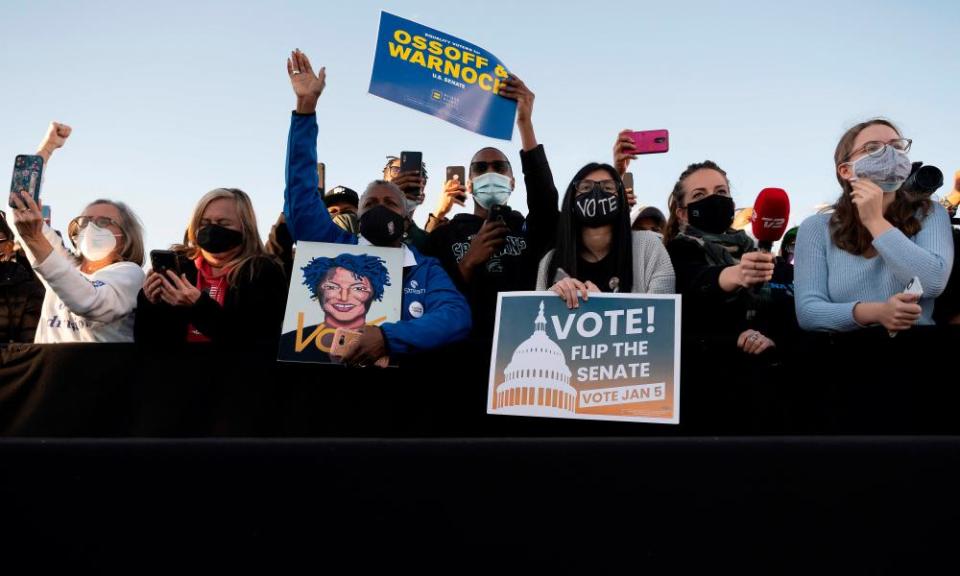US activists who helped flip Georgia call for more progressive state policies

On Wednesday, 6 January, Georgia Democrats Jon Ossoff and the Rev Raphael Warnock clinched two Senate seats, bringing the US Senate to a 50-50 split with a Democratic majority once the Biden administration begins. This historic win was due in large part to the work of Black and brown organizers across the state, who spent weeks canvassing Georgia and helping people register to vote, which was often complicated due to the Covid-19 pandemic.
The election of Jon Ossoff and Rafael Warnock to Congress has a huge potential for new and progressive federal policy that would affect the country as a whole. However, this win has less sway on local laws. This is where many organizers in Georgia see their work turning to in the coming years.
“We will have an uphill battle to get policy changes on a state level, but federally it will mean policy changes that will benefit our communities can be implemented based upon elected officials with shared policy visions,” said Helen Butler, the executive director of the Coalition for the Peoples’ Agenda in Georgia. “I’m looking for an immediate passage of the John Lewis Voting Rights Act and the George Floyd Criminal Justice Reform Act, and affordable healthcare passed on the federal level. We will continue to fight for voting rights, criminal justice reform, healthcare and economic justice on a state and local level.”
On a national level, many progressive organizers across the country have been advocating for radical measures such as prison abolition, defunding the police, and the Green New Deal. Black progressives in particular have been pushing hard for these demands. Recent data from FiveThirtyEight notes that while the “defund the police” demand is unpopular with Americans as a whole, the story changes when you break beliefs down by demographic. While white respondents opposed defunding the police by up to 61%, Black respondents supported the demand by an average of 45%. Butler says that organizers in Georgia are pushing for the same on a local level.
“In Georgia, public schools have been defunded over time through legislation enabling voucher programs to funnel dollars to private education – a measure that essentially perpetuates inequity and segregation at the earliest phases of life,” Butler said. “Advocates pushing for defunding the police and climate justice are merely asking for our budgets to reflect our morals, which center the marginalized and overlooked.”
Kaila Pouncy, a Georgia native and student at the University of Alabama, knocked on nearly 400 doors in her community and helped folks find their polling locations, check the status of their absentee ballot, and get rides to the polls ahead of the election. She said she’s hoping for long-term changes in the state.
“As a Georgia native, I never thought I’d see the day Georgia wore blue,” Pouncy said. “Not only does this signify a change in our politics with our state becoming increasingly more progressive, but the results of this election served as prime evidence that methods of civic engagement and grassroots movements organized by our mobilizers and activists are effective.”
Tiffany Roberts, the community engagement and movement building counsel at the Southern Center for Human Rights and an active organizer and political educator in Georgia, feels personally thrilled by Warnock’s win in particular, as he was her pastor at her local church. She said her team at the Southern Center for Human Rights is already in the planning stages for the progressive policies they are hoping to get passed.
“The dream would be a comprehensive piece of legislation that addresses many of the root causes of systemic racism as codified in our laws,” she said. “We continue to advocate here in Georgia around bail reform and the decriminalization of quality of life offenses and drug laws. We also have a vested interest in reforms that would allow community members to return from incarceration and start their lives out without the shackles of being labeled as convicts or criminals.”
Overall, many organizers are optimistic for the future, and believe beneficial policy changes will be made due to a combination of continued local, grassroots organizing and newer, more progressive politicians being elected to power.
“During and since the uprisings in Atlanta, we’ve seen a rightward turn in local governance, marked by hundreds of arrests of protesters over the summer and an ongoing refusal to dismiss most of the charges,” said Micah Herskind, an Atlanta-based abolitionist organizer.
“But all of our city councilors and our mayor are up for re-election in 2021, as are others across the state, so I’m excited about how we can channel the energy from the runoffs into local organizing and local transformation. Georgia’s electorate has made clear that the state is headed in a new direction, and local officials are going to need to keep up or get voted out.”

 Yahoo Finance
Yahoo Finance 